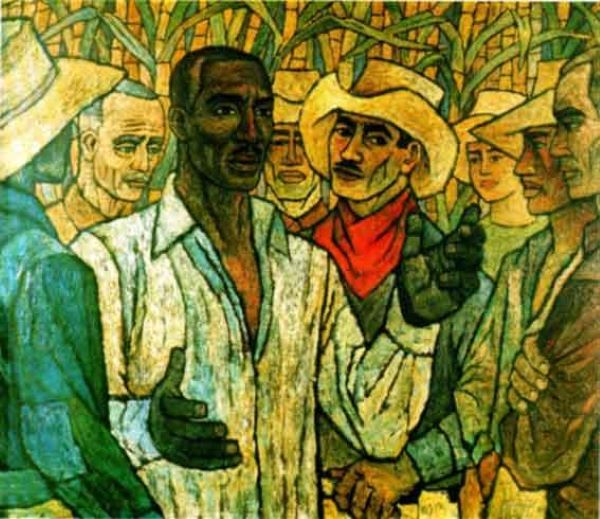A man of conviction and loyalty to the working class, Jesús Menéndez Larrondo embraced from his adolescence, with courage and energy, the revolutionary and patriotic ideology claimed by his people.
Cubans, workers, and laborers, especially the sugar workers, remember him as he was, with his intelligence, selflessness, willingness to fight and courage; his ability to find the key to situations in difficult moments, his cordiality and "people skills" which did not attenuate his revolutionary firmness, for he was like steel, flexible; like a diamond, hard.
He was born on 14 December 1911, 110 years ago now, in a typical Cuban rural house, made of palm boards and a guano roof, on the La Palma estate very close to Encrucijada, in what was then Las Villas province.
It is known that this great-grandson of slaves, son, and grandson of mambises was deeply a Martí follower and that in his few school years - he only reached the fourth grade - he liked to participate in events, where he recited verses of the Apostle and read many of his writings.
He grew up in the midst of poverty, aggravated by his black condition, which led him at the age of 15 to work as a sugar cane cutter to help his family, a period in which he also devoted himself to reading everything he could get his hands on.
During periods of downtime in the sugar mills, he sold chickens and root crops or worked in the tobacco factories. In the rigor of work and low wages, Jesús Menéndez's acute sensitivity strengthened his class awareness.
Thus, at the age of just 20, he joined the clandestine Communist Party of Cuba - under the pseudonym of Junio - and began an intense proletarian work, touring the central offices, calling on the bosses, speaking to the workers, and teaching them methods of struggle for their demands. This was the emergence of what Nicolás Guillén, the national poet, would call the General de las Cañas.
He was one of the most extraordinary autodidacts in Cuban history, considering that he did not pass the fourth grade of primary education and was capable of profound analysis. He was seen arguing with tycoons, senior figures in the government, and the neighboring empire.
A direct and easy speaker, as Nicolás Guillén acknowledged, he dragged his "r" "like a Frenchman reluctant to forget his childhood language.'' And in his Elegy to Jesús Menéndez he summed up in verse the life of a combative personality: "The journey was long and the road rough/ A tree grew with blood from my wound/ A bird sings of life from it/ Morning announces itself like a trill."
He dressed with discreet elegance and good taste, but without the luxury of any kind. He had a good sense of humor but was not inclined to jokes that might hurt the sensibilities of others. He was never authoritarian, but convincing and reasoning, and of natural delicacy when it came to making an indication or criticism. He wanted to turn sugar into the crucible of the economy, but at the service of every Cuban man and woman, following Martí's motto of a homeland "with everyone and for the good of everyone."
In just seven years (1940-1947), thanks to his administration, he managed to wrest a total of 631 million dollars from the dominant oligarchy in favor of the sugar industry workers. His most significant achievements were the Sugar Differential, the Sugar Retirement Fund, and the Guarantee Clause, which were beneficial for the Cuban economy and for the family income of the workers. He also achieved the payment of overtime for the workers, the raising of sugar workers' wages, their inclusion in the retirement scheme, the sanitation of the bateyes, and other measures of a social nature.
Jesús Menéndez was, without a doubt, the black hero who won an infinity of victories in favor of the most humble, among which are also the wage increase for the railway and maritime workers, the improvement of the workers, his concern for the technological development and modernization of the sugar mills and the development of the derivatives industry.


Deje un comentario